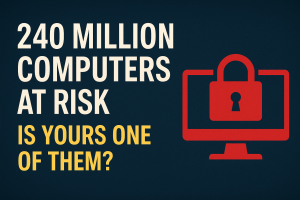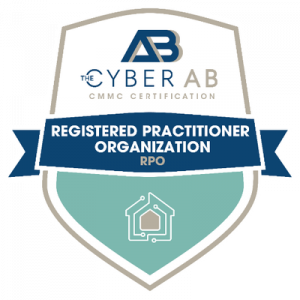 With Windows 10 support ending, outdated systems are prime targets for cyberattacks. This guide will help you avoid becoming the next easy victim.
With Windows 10 support ending, outdated systems are prime targets for cyberattacks. This guide will help you avoid becoming the next easy victim.
As a Managed IT Services provider in Southern New England, we’ve seen firsthand how quickly cybercriminals pounce on outdated systems. When Microsoft retired Windows 7, hackers wasted no time launching attacks against unprotected computers. Now, with Windows 10's retirement looming, we're facing a similar - but potentially more severe - security crisis.
Upgrading your business computers might not be top of mind. But here's the harsh reality: continuing to run outdated systems is like leaving your digital front door wide open with a "Welcome Hackers" sign.
According to Reuters, the Windows 10 retirement will affect roughly 240 million computers worldwide. That’s a lot of potential targets. If history repeats itself (which it tends to in cybersecurity), attackers are already preparing for the moment Microsoft stops releasing security patches. And unlike previous upgrades, jumping to Windows 11 isn’t as simple as adding RAM. It requires a TPM chip—onboard hardware security that older systems often lack. Without it, your computers just won’t cut it.
This means more than just slowing down your staff, it’s a triple threat:
- Aging equipment that’s already reducing productivity
- Incompatibility with Windows 11
- The looming risk of attacks once Windows 10 support ends
Microsoft is offering extended support… for a price. It starts at $61 per device and doubles every year. That’s a temporary patch for a growing problem.
Here’s a better question: How much time and money are you already losing to slow systems? What would it cost if ransomware shut your business down? The IT world hasn’t faced a convergence like this in decades. A lot of computers entered service in 2020 during COVID shelter in place/work from home directives. In particular, a lot of new laptops were purchased to enable WFH. With laptops having a 5-year recommended lifecycle they are now due for replacement. Two lifecycles colliding, rising hardware costs, possible tariffs, and serious risk for companies who delay.
You’ve got options: purchasing, leasing, even hardware-as-a-service. But timing is everything. Delays could mean higher costs and longer wait times.
Don’t be the next cybersecurity headline. The smart move is to act now.
➡️ Let’s talk about the best upgrade plan for your business and budget. Schedule your free 15-minute Discovery Call today: https://i-m.tech/discoverycall
Looking forward to your feedback.



